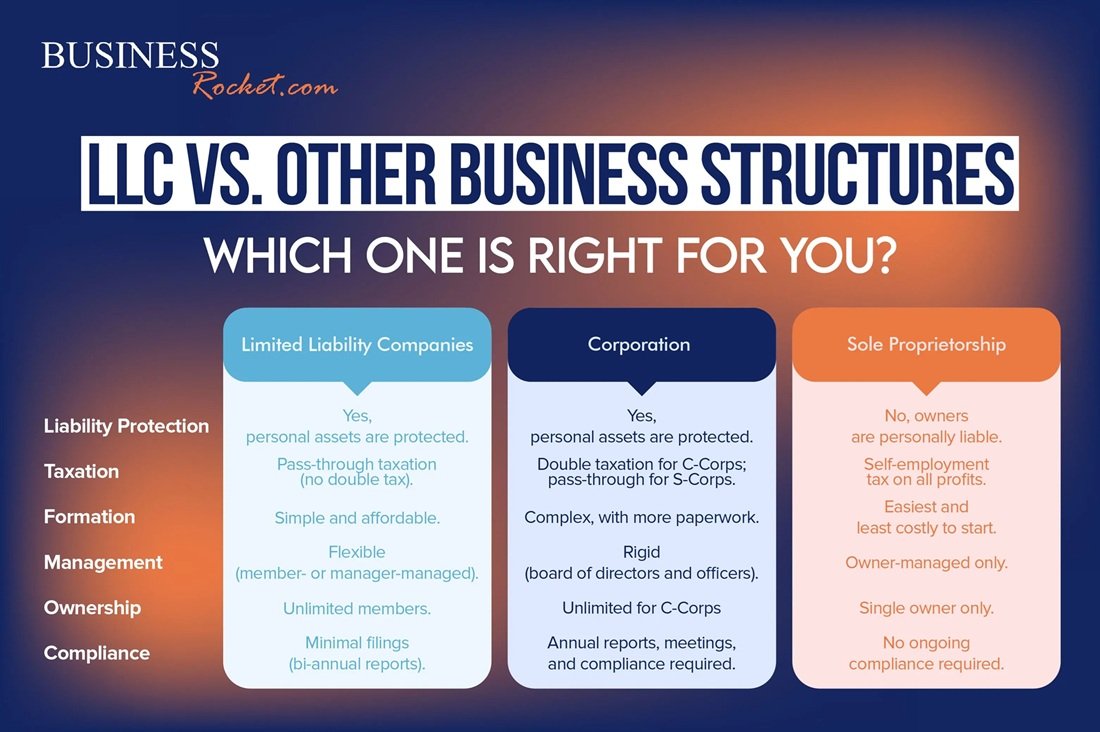Do You Need an LLC to Start a Business is an exciting venture, but it can also be filled with challenges. One of the biggest decisions that entrepreneurs face when starting a business is choosing the right legal structure. A popular option for many is forming a Limited Liability Company (LLC). However, not all businesses are required to form an LLC, and the decision depends on various factors including the type of business, the level of liability protection you need, and the tax structure you prefer. In this article, we will explore whether you need an LLC to start a business and the benefits of forming one.
What is an LLC?
Before diving into whether you need an LLC to start a business, it’s important to understand what an LLC is. A Limited Liability Company (LLC) is a legal entity that combines the flexibility of a partnership with the liability protection of a corporation. Essentially, it provides a shield that separates your personal assets from your business debts and obligations.
Benefits of an LLC
An LLC offers several advantages, including:
- Limited liability protection: Your personal assets (home, car, etc.) are protected from business debts or lawsuits.
- Tax flexibility: LLCs are not taxed as a separate entity, meaning profits and losses can pass through to your personal tax return, avoiding double taxation.
- Credibility: Having an LLC can help establish credibility with customers, suppliers, and investors.
- Ownership flexibility: LLCs can have an unlimited number of members (owners) and can be structured in various ways.
For many entrepreneurs, these benefits make forming an LLC an appealing choice. However, it’s not always necessary, and other structures may work better for certain situations.
Do You Need an LLC to Start a Business?

The simple answer is no, you do not need an LLC to start a business. In fact, there are multiple legal structures you can choose from, each with its own pros and cons. The best choice depends on your specific business needs, goals, and risk tolerance. Let’s look at some of the alternatives to forming an LLC.
Sole Proprietorship
A sole proprietorship is the simplest and most common business structure, especially for small businesses and solo entrepreneurs. If you don’t register your business as an LLC or corporation, it is automatically considered a sole proprietorship.
Key Features of a Sole Proprietorship:
- Easy to set up: No formal registration is required, and you can operate under your own name or register a trade name (also known as a “doing business as” or DBA name).
- Tax benefits: Like an LLC, profits and losses pass through to your personal tax return, avoiding double taxation.
- Full control: As the sole owner, you have complete control over decision-making.
However, one major drawback of a sole proprietorship is that it does not provide liability protection. Your personal assets are at risk if your business faces legal issues or debt.
Partnership
If you’re starting a business with a partner, a partnership may be a good option. In a partnership, two or more individuals share ownership of the business. There are two common types of partnerships: general partnerships and limited partnerships.
Key Features of a Partnership:
- Shared responsibility: Partners share the decision-making and financial responsibilities.
- Tax benefits: Similar to a sole proprietorship, partnerships pass profits and losses through to the partners’ personal tax returns.
- Flexibility: Partnerships can be structured in various ways, allowing you to create roles that fit your specific business needs.
However, just like a sole proprietorship, a general partnership does not provide liability protection. In a general partnership, all partners are personally liable for the business’s debts and obligations. A limited partnership, on the other hand, offers some liability protection to limited partners but not to general partners.
Corporation
A corporation is a more complex legal structure than an LLC or sole proprietorship. It is a separate legal entity that is owned by shareholders. Corporations are ideal for businesses that plan to go public or need to raise capital from investors.
Key Features of a Corporation:
- Limited liability protection: Shareholders are not personally responsible for the corporation’s debts or legal issues.
- Ability to raise capital: Corporations can sell shares to raise funds.
- Perpetual existence: A corporation continues to exist even if ownership changes or the original founders leave.
However, corporations are subject to double taxation. The corporation itself is taxed on its profits, and shareholders are taxed again on dividends. Additionally, corporations have more administrative requirements, including formal meetings and record-keeping.
When Should You Consider Forming an LLC?

While forming an LLC is not required to start a business, there are certain situations where it makes sense to do so. Consider forming an LLC if:
1. You Need Liability Protection
If your business involves any level of risk (such as physical products, services with potential for injury, or financial transactions), you may want to protect your personal assets from lawsuits and debts. An LLC offers limited liability protection, which means your personal assets (like your home or car) are not at risk in case of business failure or legal action.
2. You Want Flexibility in Taxes
LLCs offer tax flexibility. By default, LLCs are taxed as pass-through entities, meaning profits are reported on the owner’s personal tax returns. However, you can also elect to be taxed as an S corporation, which may provide additional tax benefits, especially for businesses with higher profits.
3. You Plan to Expand or Bring on Partners
LLCs can accommodate multiple members (owners), making them a good option if you plan to bring in partners or investors. Unlike a sole proprietorship, an LLC allows you to share ownership without exposing your personal assets to business liabilities.
4. You Want to Establish Business Credibility
In some industries, having an LLC can provide an added level of credibility. It signals that your business is a legally recognized entity, which can build trust with customers, suppliers, and other businesses.
How to Form an LLC

If you decide that an LLC is right for your business, here’s a general overview of how to form one:
1. Choose a Name for Your LLC
The name of your LLC must be unique and comply with your state’s rules for LLC names. It must include the words “Limited Liability Company” or an abbreviation like “LLC” or “L.L.C.”.
2. File Articles of Organization
To officially form your LLC, you will need to file a document called Articles of Organization with the Secretary of State in the state where you plan to operate. There is typically a filing fee involved.
3. Create an Operating Agreement
Although not required in all states, it’s highly recommended to have an Operating Agreement. This document outlines the ownership structure, roles, and responsibilities of LLC members.
4. Obtain Necessary Permits and Licenses
Depending on your business, you may need to apply for various local, state, or federal permits and licenses.
5. Get an EIN (Employer Identification Number)
Most LLCs are required to obtain an EIN from the IRS. This number is used for tax purposes and is required if you plan to hire employees.
Conclusion
Do You Need an LLC to Start a Business, it offers several advantages, particularly when it comes to liability protection and tax flexibility. Whether or not you should form an LLC depends on your business structure, risk level, and long-term goals. If you’re unsure about the best structure for your business, it’s always a good idea to consult with a legal or financial professional who can help you make an informed decision.
Desclaimer
The information provided in this article is for general informational purposes only and should not be considered legal or financial advice. Always consult with a qualified professional or attorney before making any decisions regarding business formation, legal structures, or tax planning to ensure compliance with applicable laws and regulations.










